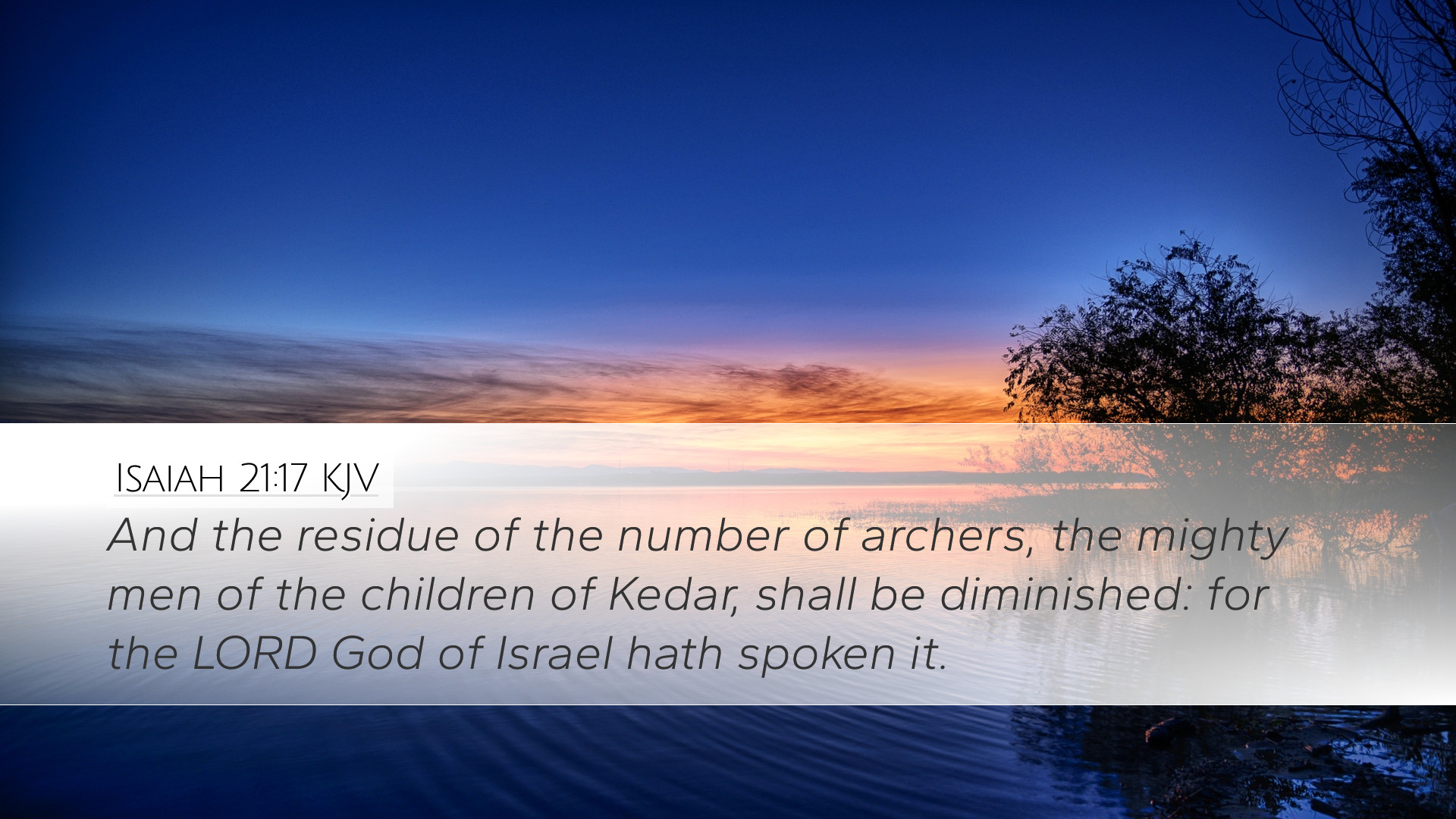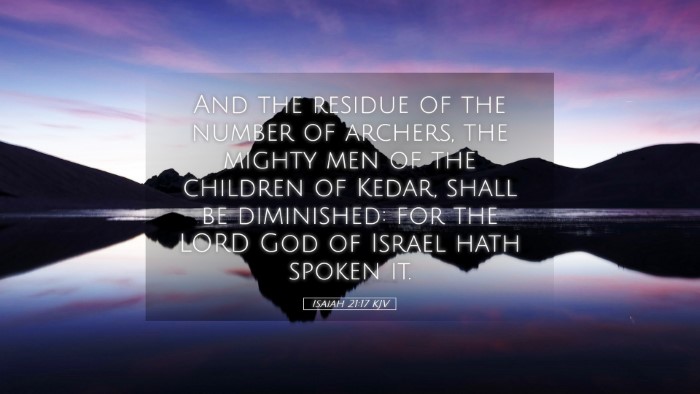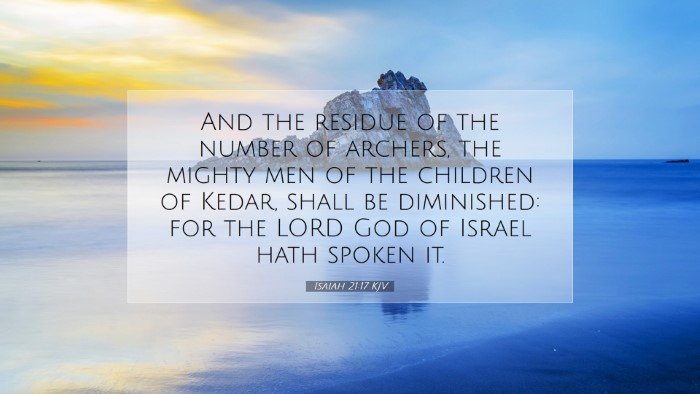Commentary on Isaiah 21:17
Bible Verse: "And the residue of the number of archers, the mighty men of the children of Kedar, shall be diminished: for the LORD God of Israel hath spoken it."
Introduction
Isaiah 21:17 presents a prophetic announcement concerning the fate of Kedar, a nomadic tribe descended from Ishmael. This brief yet powerful verse underlines the effective judgment and sovereignty of God over historical and future events. Through an analysis of various public domain commentaries, this summary will explore the implications of this verse, emphasizing its theological significance and practical applications for theologians, pastors, and scholars.
The Context of the Prophecy
In Isaiah's prophetic writings, the oracles against nations often serve dual purposes: announcing judgment and offering hope. At the time of this prophecy, Kedar was an important military power, known for its archers and nomadic lifestyle. The passage conveys God’s promise of judgment against Kedar, indicating that their strength and might would ultimately fail.
Historical Background
Albert Barnes explains that Kedar was one of the prominent tribes among the Ishmaelites, frequently referenced in the Bible in connection with trade and military prowess. Isaiah's prophetic utterance reflects the geopolitical landscape of his time, where the stability of nations depended largely on military capabilities.
Thematic Elements
Divine Sovereignty
This passage highlights God's supreme authority over nations. Adam Clarke notes that God's declarations are not merely wishes; they hold the power to bring about change. The statement "for the LORD God of Israel hath spoken it" reinforces the certainty of the impending judgment. Henry emphasizes that while human might may appear formidable, it cannot withstand the decrees of God.
The Diminishing of Strength
The phrase "the residue of the number of archers" signifies a decrease in military might. Those who had once boasted of their strength would find it eroded by divine intervention. This theme resonates with the overarching message of the book of Isaiah, where human pride is consistently brought low under the hand of God.
Prophetic Assurance
Isaiah's prophecy reassures that no force can circumvent God’s plan. Kedar's eventual diminishment is not merely a warning but also serves as a testament to God’s unwavering justice. Matthew Henry highlights that God's judgments, though sometimes delayed, are inevitable and serve a purpose in the grand scope of redemption history.
Theological Implications
The implications of Isaiah 21:17 stretch beyond its immediate context, providing profound insights into the nature of God and His dealings with humanity.
God's Justice and Righteousness
Isaiah 21:17 illustrates that God's justice will prevail. As noted by Albert Barnes, not only does God hold nations accountable for their actions, but He also employs them as instruments to fulfill His purposes. The judgment against Kedar reflects divine righteousness as God acts against those who oppose His will.
The Nature of Prophecy
This verse draws attention to the role of prophecy in guiding believers. Prophecies serve as warnings and indications of divine purpose, prompting reflection on one's conduct. Adam Clarke emphasizes the importance of understanding prophetic messages, which require discernment and a willingness to heed the warnings conveyed.
Application for Believers
The teachings derived from this verse offer valuable insights for modern believers and church leaders.
Dependence on God
The diminishing strength of Kedar serves as a reminder of the futility of relying on human might. Pastors and spiritual leaders can use this verse to encourage their congregations to place their trust in the Lord rather than in worldly powers, calling for reliance on God during turbulent times.
The Call to Humility
Isaiah 21:17 invites reflection on human pride. In a world that often celebrates strength and self-sufficiency, believers are called to recognize that true strength lies in humility before God. Matthew Henry provides a reminder that "the humblest service is advanced to the highest honor" in God's kingdom.
Awareness of God's Sovereignty
The verse emphasizes God’s ultimate control over worldly affairs, providing peace amid uncertainty. The acknowledgment of God’s sovereignty helps believers navigate the complexities of life, offering reassurance that no matter how formidable the opposition, God’s plans will not be thwarted.
Conclusion
In conclusion, Isaiah 21:17 encapsulates profound truths regarding God's sovereignty, justice, and the inevitable consequences of pride. By engaging with the insights from public domain commentaries, readers gain a richer understanding of this pivotal verse. It serves as both a warning and a source of hope, encouraging believers to trust in the steadfastness of God’s word amidst the changing tides of human history.
As we reflect on these teachings, may we be inspired to live faithfully, understanding that God’s declarations are a reliable foundation for our faith and practice.


